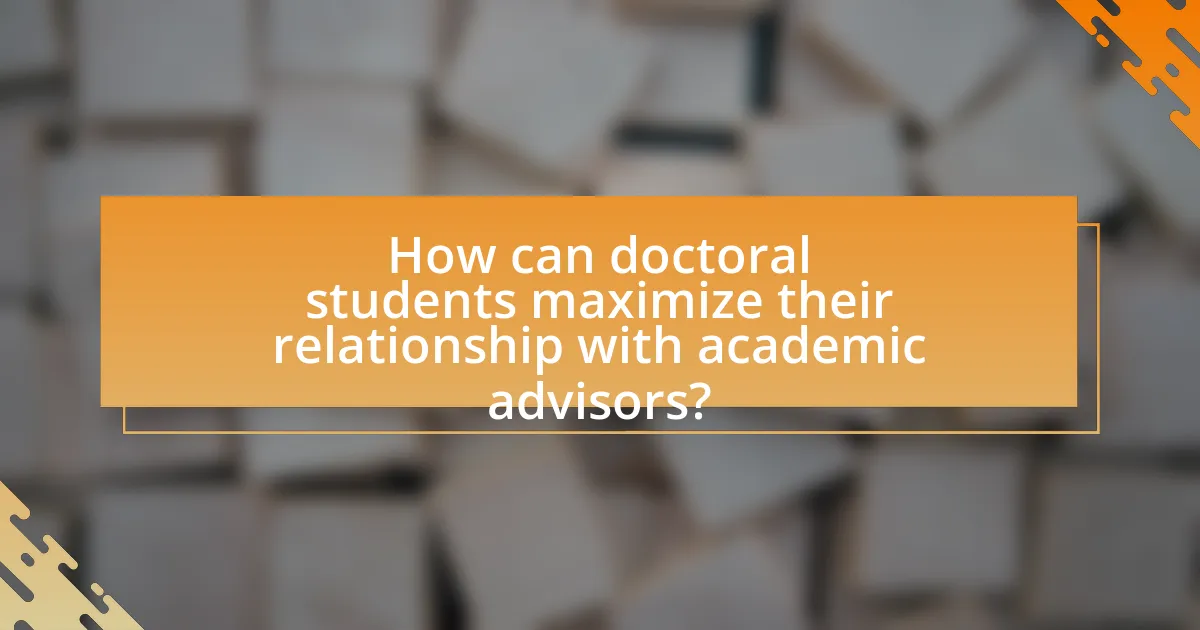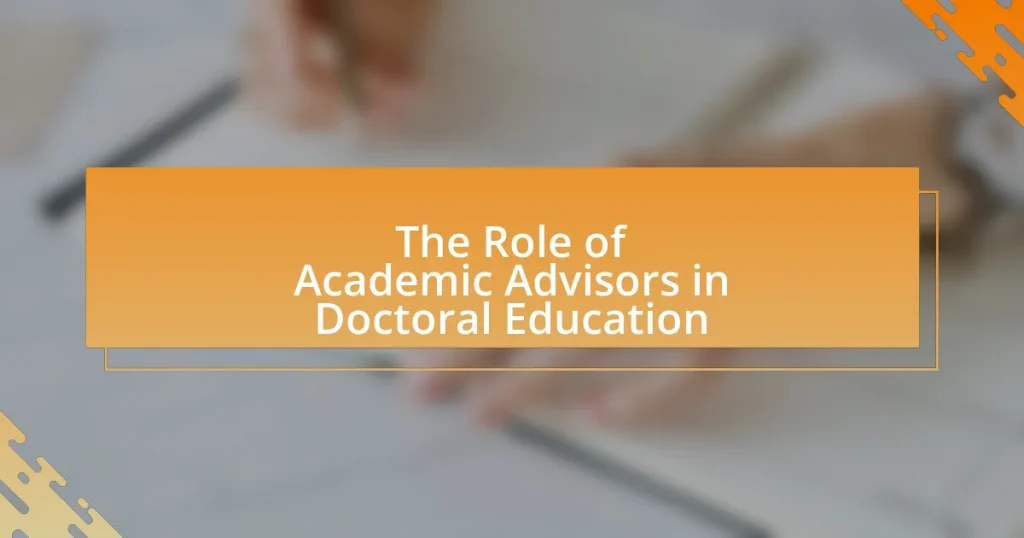Academic advisors play a crucial role in doctoral education by guiding students through their academic journey, providing support in course selection, research proposal development, and funding opportunities. They facilitate connections with faculty and industry professionals, monitor student progress, and offer feedback essential for timely graduation. The article outlines the specific guidance advisors provide, their impact on student retention and success, and the strategies students can employ to maximize their relationship with advisors. Additionally, it addresses common challenges in advisor-student relationships and best practices for effective collaboration, emphasizing the importance of academic advisors in enhancing the doctoral experience.

What is the Role of Academic Advisors in Doctoral Education?
Academic advisors in doctoral education serve as essential guides for students navigating their academic journey. They provide critical support in selecting courses, developing research proposals, and identifying funding opportunities, which are vital for successful program completion. Additionally, academic advisors facilitate connections with faculty and industry professionals, enhancing networking and collaboration prospects. Their role also includes monitoring student progress and offering feedback, which is crucial for maintaining academic standards and ensuring timely graduation. Research indicates that effective advising positively impacts student satisfaction and retention rates in doctoral programs, underscoring the importance of their contributions to the educational experience.
How do academic advisors support doctoral students?
Academic advisors support doctoral students by providing guidance on academic requirements, research direction, and professional development. They help students navigate the complexities of their programs, ensuring they meet milestones such as coursework, comprehensive exams, and dissertation proposals. Advisors also offer mentorship, facilitating networking opportunities and connecting students with resources, which enhances their academic and career prospects. Research indicates that effective advising positively impacts student retention and success rates in doctoral programs, underscoring the critical role advisors play in shaping the educational experience.
What specific guidance do academic advisors provide during the doctoral journey?
Academic advisors provide critical guidance during the doctoral journey by assisting students in developing research proposals, selecting appropriate coursework, and navigating institutional requirements. They help students identify and refine their research interests, ensuring alignment with faculty expertise and available resources. Additionally, academic advisors offer support in establishing timelines for milestones such as comprehensive exams and dissertation defenses, which are essential for timely program completion. They also facilitate networking opportunities and provide insights into publishing and presenting research, which are vital for academic and professional development. This structured support is crucial, as studies indicate that effective advising significantly enhances doctoral students’ success rates and overall satisfaction with their educational experience.
How do academic advisors assist in the development of research skills?
Academic advisors assist in the development of research skills by providing guidance on research methodologies, facilitating access to resources, and offering feedback on research proposals. They help students identify appropriate research topics and design effective research plans, ensuring alignment with academic standards. Advisors also mentor students in critical thinking and analytical skills, which are essential for conducting rigorous research. Evidence shows that students who engage regularly with their advisors demonstrate improved research competencies and higher completion rates in doctoral programs, as highlighted in studies by the Council of Graduate Schools.
Why is the role of academic advisors critical in doctoral education?
The role of academic advisors is critical in doctoral education because they provide essential guidance and support throughout the complex process of earning a doctorate. Academic advisors help students navigate their research, develop their academic skills, and make informed decisions about their career paths. Research indicates that effective advising can significantly enhance student retention and success rates; for instance, a study published in the Journal of Higher Education found that students with strong advisor relationships are more likely to complete their degrees on time. This underscores the importance of academic advisors in fostering a supportive environment that promotes academic achievement and professional development in doctoral education.
What impact do academic advisors have on student retention and success?
Academic advisors significantly enhance student retention and success by providing personalized guidance and support throughout the educational journey. Research indicates that students who engage regularly with academic advisors are more likely to persist in their programs and achieve their academic goals. For instance, a study published in the Journal of College Student Development found that effective advising correlates with higher graduation rates, as advisors help students navigate academic challenges, set realistic goals, and connect with resources. Additionally, advisors play a crucial role in fostering a sense of belonging and community, which is essential for student motivation and retention.
How do academic advisors influence the academic and professional development of doctoral students?
Academic advisors significantly influence the academic and professional development of doctoral students by providing guidance, mentorship, and resources tailored to their specific needs. Advisors help students navigate complex academic requirements, ensuring they meet milestones such as coursework, comprehensive exams, and dissertation progress. Research indicates that effective advising correlates with higher student satisfaction and retention rates, as advisors facilitate networking opportunities, recommend relevant conferences, and assist in publishing research, which are critical for career advancement. Furthermore, studies show that students with strong advisor relationships report increased confidence and clarity in their academic and career goals, underscoring the pivotal role advisors play in shaping successful doctoral journeys.

What are the key responsibilities of academic advisors in doctoral programs?
Academic advisors in doctoral programs are primarily responsible for guiding students through their academic journey, ensuring they meet program requirements and achieve their research goals. They assist in course selection, monitor academic progress, provide mentorship, and facilitate professional development opportunities. Additionally, academic advisors help students navigate institutional policies and resources, fostering a supportive environment that enhances the doctoral experience. Their role is crucial in helping students develop research proposals, prepare for comprehensive exams, and ultimately complete their dissertations, which are essential milestones in doctoral education.
How do academic advisors facilitate the dissertation process?
Academic advisors facilitate the dissertation process by providing guidance, support, and resources to doctoral students. They assist in defining research topics, developing proposals, and navigating institutional requirements. Advisors also offer feedback on drafts, help students refine their methodologies, and connect them with relevant literature and research networks. Studies show that effective advising can significantly enhance a student’s ability to complete their dissertation on time, as evidenced by research indicating that students with active advisor engagement report higher satisfaction and success rates in their doctoral programs.
What strategies do academic advisors use to help students select dissertation topics?
Academic advisors employ several strategies to assist students in selecting dissertation topics. These strategies include facilitating brainstorming sessions, encouraging exploration of personal interests, and providing access to relevant literature and research trends. By guiding students through structured discussions, advisors help them identify gaps in existing research and align their topics with academic and career goals. Additionally, advisors often leverage their networks to connect students with faculty members who have expertise in specific areas, enhancing the quality of topic selection. This multifaceted approach ensures that students choose dissertation topics that are both feasible and significant within their field of study.
How do academic advisors guide students through the proposal and defense stages?
Academic advisors guide students through the proposal and defense stages by providing structured feedback, resources, and mentorship. They assist students in developing a clear and feasible research proposal by helping them refine their research questions, identify relevant literature, and establish a methodology. Advisors also prepare students for the defense stage by conducting mock defenses, offering insights into the evaluation criteria, and helping them anticipate potential questions from the committee. This guidance is crucial, as studies show that effective advisor support significantly enhances students’ confidence and performance during these critical phases of their doctoral education.
What role do academic advisors play in networking and professional development?
Academic advisors play a crucial role in networking and professional development by facilitating connections between students and industry professionals, as well as providing guidance on career paths. They leverage their own professional networks to introduce students to potential mentors, internships, and job opportunities, which enhances students’ employability. Research indicates that students who engage with their academic advisors are more likely to secure relevant professional experiences, as advisors often have insights into industry trends and expectations. Additionally, academic advisors assist in developing essential skills such as resume writing and interview techniques, further supporting students’ professional growth.
How do academic advisors connect students with research opportunities and conferences?
Academic advisors connect students with research opportunities and conferences by leveraging their professional networks and knowledge of available resources. They actively inform students about relevant research projects, funding opportunities, and upcoming conferences that align with their academic interests and career goals. Advisors often facilitate introductions to faculty members and researchers who can provide mentorship or collaboration opportunities. Additionally, they may guide students in preparing applications for research grants or conference presentations, ensuring that students are well-prepared to engage with the academic community. This connection is crucial for enhancing students’ research experience and professional development in their respective fields.
What resources do academic advisors provide for career planning and job placement?
Academic advisors provide a variety of resources for career planning and job placement, including personalized career counseling, access to job search tools, networking opportunities, and information on internships and fellowships. Personalized career counseling helps students identify their strengths and career goals, while job search tools such as resume workshops and interview preparation sessions equip them with essential skills. Networking opportunities, often facilitated through alumni connections and professional organizations, allow students to build relationships in their desired fields. Additionally, advisors offer information on internships and fellowships that provide practical experience, enhancing employability. These resources collectively support students in navigating their career paths effectively.

How can doctoral students maximize their relationship with academic advisors?
Doctoral students can maximize their relationship with academic advisors by maintaining open and consistent communication. Regularly scheduling meetings, being prepared with specific questions or topics, and actively seeking feedback fosters a productive dialogue. Research indicates that effective communication enhances the advisor-advisee relationship, leading to better academic outcomes and increased satisfaction (Baker & Pifer, 2011, “The Role of Academic Advising in Graduate Education,” Journal of Higher Education). Additionally, demonstrating initiative and taking responsibility for one’s own research and academic progress shows respect for the advisor’s time and expertise, further strengthening the relationship.
What strategies can students employ to effectively communicate with their advisors?
Students can employ several strategies to effectively communicate with their advisors, including preparing for meetings, being clear and concise in their communication, and actively listening. Preparing for meetings involves outlining specific topics or questions to discuss, which helps maximize the productivity of the time spent together. Clarity and conciseness in communication ensure that the advisor understands the student’s needs and concerns without ambiguity. Active listening allows students to fully grasp the advisor’s feedback and suggestions, fostering a more collaborative relationship. These strategies enhance the overall communication process, leading to more effective guidance and support in the doctoral education journey.
How can students prepare for meetings with their academic advisors?
Students can prepare for meetings with their academic advisors by reviewing their academic progress, setting specific goals, and preparing questions or topics for discussion. Reviewing academic progress allows students to identify strengths and weaknesses, which can guide the conversation. Setting specific goals helps to focus the meeting on actionable outcomes, such as course selection or research opportunities. Preparing questions ensures that students address their concerns and gain valuable insights from their advisors. This structured approach enhances the effectiveness of the meeting and fosters a productive advisor-student relationship.
What questions should students ask their advisors to gain the most benefit?
Students should ask their advisors questions that clarify academic expectations, research opportunities, and career pathways. Specific questions include: “What are the key milestones I should aim for in my program?” This question helps students understand the timeline and requirements for their degree. Additionally, asking “Can you recommend specific research projects or topics that align with my interests?” allows students to explore relevant opportunities. Furthermore, inquiring “What skills should I develop to enhance my employability after graduation?” provides insight into essential competencies in their field. These questions are crucial as they guide students in navigating their academic journey effectively and aligning their goals with available resources and opportunities.
What common challenges do students face in their relationship with academic advisors?
Students commonly face challenges such as lack of communication, differing expectations, and limited availability in their relationship with academic advisors. These issues can lead to misunderstandings regarding academic goals and program requirements. For instance, a study published in the Journal of Higher Education found that 40% of students reported feeling unclear about their advisor’s expectations, which can hinder their academic progress. Additionally, advisors may have limited office hours or be overwhelmed with other responsibilities, making it difficult for students to receive timely guidance. This lack of accessibility can exacerbate feelings of isolation and confusion among students navigating their doctoral programs.
How can students address misunderstandings or conflicts with their advisors?
Students can address misunderstandings or conflicts with their advisors by initiating a direct and respectful conversation to clarify issues. Open communication allows students to express their concerns and seek mutual understanding, which is essential in resolving conflicts. Research indicates that effective communication strategies, such as active listening and expressing feelings without assigning blame, can significantly improve advisor-student relationships. For instance, a study published in the Journal of Higher Education found that students who engage in constructive dialogue with their advisors report higher satisfaction and better academic outcomes.
What steps can students take if they feel their advisor is not meeting their needs?
Students can take several steps if they feel their advisor is not meeting their needs. First, they should communicate their concerns directly with the advisor, providing specific examples of how their needs are unmet. This direct approach can clarify misunderstandings and potentially lead to improved support. If the situation does not improve, students can seek guidance from a secondary advisor or faculty member within their department, as many programs have policies for addressing advisor-related issues. Additionally, students may consider utilizing university resources such as counseling services or academic support offices, which can offer strategies for navigating advisor relationships. Documenting all interactions and concerns can also be beneficial if further escalation is necessary, such as involving the department chair or graduate program director.
What best practices should doctoral students follow when working with academic advisors?
Doctoral students should establish clear communication with their academic advisors to ensure effective guidance and support. This involves scheduling regular meetings, being prepared with specific questions or topics for discussion, and actively listening to feedback. Additionally, students should set realistic goals and timelines for their research and academic progress, which helps advisors provide tailored advice. Documenting discussions and action items from meetings can enhance accountability and track progress. Research indicates that effective advisor-student relationships positively impact doctoral completion rates, highlighting the importance of these practices in fostering a productive academic environment.



